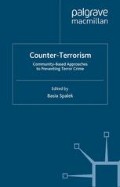Abstract
In researching the evolution of community-based approaches to countering terrorism, an important finding has been the development of innovative practices by community organizations in relation to women’s roles — potential and actual — in violent extremism and in its prevention. While both the definition of ‘community’ and the approaches explored throughout this book necessarily include women, the gender-specific nature of some of the work deserves separate analysis. Additionally, the inclusion, indeed active participation and leadership, of women in this arena challenges a number of academic theories and social discourses in relation to Muslim women, their perceived social roles and their relevance to understanding security. This chapter will therefore unpick the multiple strands surrounding these issues, beginning with the broader historical discourses which act as the backdrop for the way in which Muslim women are viewed within the security arena and ending with an exploration of grassroots work by and for Muslim women that contributes towards countering terrorism.
Access this chapter
Tax calculation will be finalised at checkout
Purchases are for personal use only
Preview
Unable to display preview. Download preview PDF.
References
Abu Lughod, L. (1993) Writing Women’s Worlds: Bedouin Stories. Berkeley, CA: University of California Press.
Adnan, I. (2006) ‘Men, Step Aside: Tackling Terrorism is Women’s Work’, The Guardian, 27 July.
Bhabha, H. (1984) ‘Of Mimicry and Man: The Ambivalence of Colonial Discourse’, Discipleship: A Special Issue on Psychoanalysis 28: 125–33.
Brunner, C. (2007) ‘Discourse — Occidentalism — Intersectionality Approaching Knowledge on “Suicide Bombing”’, Political Perspectives 1(2): 1–25.
Cook, D. (2005) ‘Women Fighting in Jihad?’, Studies in Conflict & Terrorism 28(5): 375–84.
DCLG (Department for Communities and Local Government) (2007) ’Preventing Violent Extremism — Winning Hearts and Minds, www.communities.gov.uk/documents/communities/pdf/320752.pdf (date accessed 15 December 2011).
—. (2008) ‘Empowering Muslim Women: Case Studies’, www.communities.gov.uk/documents/communities/pdf/669801.pdf (date accessed 15 December 2011).
Feinman, I.R. (2000) Citizenship Rites: Feminist Soldiers and Feminist Antimilitarists. New York University Press.
Feminist Institute of the Heinrich Böll Foundation (2005) ‘Security for All — A Feminist Critique of the New Security Agenda’, Discussion Paper by the Feminist Institute of the Heinrich Böll Foundation, based on the expert input of the Working Group ‘Gender in Security Policy and Civil Conflict Prevention’, September.
Freedman, J. (2007) ‘Women, Islam and Rights in Europe: Beyond a Universalist/ Culturalist Dichotomy’, Review of International Studies 33: 29–44.
Githens-Mazer, J. and Lambert, R. (2011) ‘Islamophobia and Anti-Muslim Hate Crime: A London Case Study’, European Muslim Research Centre (EMRC), University of Exeter, http://centres.exeter.ac.uk/ernrc/publications/Islamophobia_and_Anti-Muslim_Hate_Crime.pdf (date accessed 15 December 2011).
Hamilton, C. (2007) ‘The Gender Politics of Political Violence: Women Armed Activists in ETA’, Feminist Review 86: 132–48.
Hasso, F.S. (2005) ‘Discursive and Political Deployments by/of the 2002 Palestinian Women Suicide Bombers/Martyrs’, Feminist Review 81: 23–51.
HM Government (2008) The Prevent Strategy: A Guide for Local Partners in England Stopping People Becoming or Supporting Terrorists and Violent Extremists. London: HMSO.
Home Office (2009) The United Kingdom’s Strategy for Countering International Terrorism, http://merln.ndu.edu/whitepapers/UnitedKingdom2009.pdf (date accessed 18 January 2012).
—. (2010) The United Kingdom’s Strategy for Countering International Terrorism, Annual Report, www.official-documents.gov.uk-/document/cm78/7833/7833.pdf (date accessed 18 January 2012).
Krylova, A. (2005) ‘Stalinist Identity from the Viewpoint of Gender: Rearing a Generation of Professionally Violent Women-Fighters in 1930s Stalinist Russia’, in S. D’Cruze and A. Rao (eds), Violence, Vulnerability and Embodiment. Oxford: Blackwell, pp. 132–60.
Lambert, R. (2010) ‘Practical Solutions’, paper presented at the Perspectives on Terrorism, Resistance, and Radicalization Al Jazeera & EMRC Conference, Doha, 27 September.
McClintock, A. (1995) Imperial Leather: Race, Gender and Sexuality in the Colonial Contest. London: Routledge.
—.(2011) Countering al-Qaeda in London: Police and Muslims in Partnership. London: Hurst.
McDonald, L.Z. (2006) ‘Islamic Feminisms: Ideas and Experiences of Convert Women in Britain’ unpublished thesis, University of York.
Moser, C.O.N. and Clark, F.C. (eds) (2001) Victims, Perpetrators or Actors? Gender, Armed Conflict and Political Violence. London: Zed Books.
Said, E. (1979) Orientalism. New York: Vintage.
Silber, M.D. and Bhatt, A. (2007). Radicalization in the West: The Homegrown Threat. New York Police Department Intelligence Division.
Spalek, 13., El-Awa, S., McDonald, L.Z. and Lambert, H. (2008–9) ‘Police-MusIim Engagement and Partnerships for the Purposes of Counter-Terrorism: An Examination’, Report and Summary Report, University of Birmingham with AHRC.
UN Security Council (2000) Resolution 1325. Adopted by the Security Council at its 4213rd meeting, 31 October, www.un.org/events/res_1325e.pdf (date accessed 18 January 2012).
Zine, J. (2002) ‘Muslim Women and the Politics of Representation’, American Journal of Islamic Social Sciences 19(4): 118–21.
Editor information
Editors and Affiliations
Copyright information
© 2012 Laura Zahra McDonald
About this chapter
Cite this chapter
McDonald, L.Z. (2012). Gender within a Counter-Terrorism Context. In: Spalek, B. (eds) Counter-Terrorism. Palgrave Macmillan, London. https://doi.org/10.1057/9781137009524_5
Download citation
DOI: https://doi.org/10.1057/9781137009524_5
Publisher Name: Palgrave Macmillan, London
Print ISBN: 978-1-349-31782-0
Online ISBN: 978-1-137-00952-4
eBook Packages: Palgrave Social Sciences CollectionSocial Sciences (R0)

